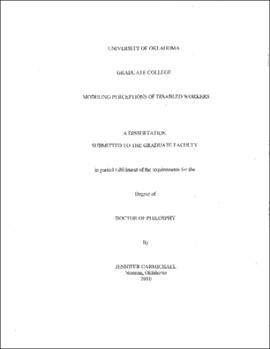| dc.description.abstract | Literature regarding attitudes toward the disabled has been dominated with a few, explicit measures that typically emphasize salient, physical disabilities. However, passage of the Americans with Disabilities Act (ADA; "Americans with Disabilities Act of 1990," 1991) has broadened previously accepted criteria for disabilities, and more non-visible, psychological and developmental conditions fall under the category of disability. This reconceptualization has not been addressed in many measures of disability, despite the clear potential for differences in the views toward different disabilities. Additionally, disability attitudes are likely to be impacted by the framing of the disabling condition. This study was an experiment designed to investigate the impact of disability type as well as use of the term `disabled' in self-descriptions. Participants were asked to report their perceptions of three individuals they believed to be study participants based upon essays written by them, in which one referred to a disabling condition of one of four types (physical, psychological, cognitive/developmental or undefined). After making judgments of the others' personality traits, participants ranked the three candidates based upon preference for a work partner on a future writing exercise. Participants then evaluated their assigned disabled teammate and anticipated team performance. Generally, participants' expectations for working with a disabled individual were surprisingly positive, and use of the term disability and disability type did not impact these expectations, though they did impact some forms of individual perceptions. Individual differences as well as demographic characteristics also impacted these relationships. Potential explanations for these findings are discussed. | |
